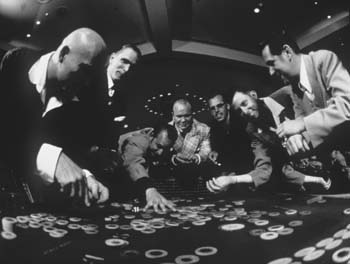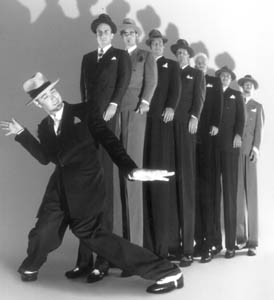![[MetroActive Music]](/gifs/music468.gif)
[ Music Index | Santa Cruz | MetroActive Central | Archives ]
The Swing of Things
Though the dance craze is mostly done, bands like Royal Crown Revue keep jumping
By Rob Pratt
LIKE EVERY DANCE CRAZE, the swing phenomenon, which has pervaded L.A. and San Francisco clubs for the past five years and local ones for the past two, has started to wane. Attendance at area swing shows is off for all but the biggest acts (Big Bad Voodoo Daddy sold out its recent Catalyst show well in advance), and the shake-out has begun among lesser bands who jumped on the swing bandwagon and are now moving on to rockabilly--or whatever ends up as the next big thing.
Which is good news and bad news for Royal Crown Revue, the band that started the whole thing. With the just-released Walk on Fire, Royal Crown Revue has easily the most compelling effort of its nearly decade-long career. In a crisply arranged, gorgeously recorded collection, the band moves between showy Havana mambo, cascading, midtempo bebop and (of course) gutsy swing.
Walk on Fire, however, offers anything but a revival of popular musical styles from midcentury. It's a savvy reflection of Gen-X attitude, leap-frogging Baby Boomer nostalgia for Motown and psychedelic rock to identify with the other great overshadowed generation of the 20th century, the "Silents," who came of age during the '40s while their older brothers were fighting the war in Europe and the Pacific. The bad news is that swing just doesn't hold sway the way it did even six months ago, explains the Catalyst's Gary Tighe, who first brought swing bands to town two years ago with a string of shows at the Cocoanut Grove and a Royal Crown Revue concert at Palookaville.
"It's going to be back where it was like six years ago," Royal Crown Revue guitarist James Achor says of the future of the swing scene. "We won't see other bands like us out on the road. It will become less about fashion and more about the music."
THE TERM swing itself is a little troubling. Until the craze came on in earnest, it both indicated the loping rhythmic feel of jazz--which lengthens the duration of the first of a pair of eighth notes and emphasizes the attack of the second--and referred to a specific era in jazz history. Benny Goodman in the late '30s became the "King of Swing" by mellowing the rhythmic intensity of "hot" big band jazz to make it more danceable or "sweet."
The peak of the Swing Era came during America's World War II years, when bandleaders like Goodman and Glenn Miller and singers like Frank Sinatra and the Andrews Sisters became superstars. At the local dance hall, swing was a tough, energetic sound tailor-made for jitterbugging--a dance so athletic that parents just couldn't do it even if they could stand the loud and raucous music. The Swing Era abruptly ended shortly after the close of the war when GIs mustering out of the service stopped going out at night, instead settling down to buy a house in the suburbs and raise a family.
"Swing" now has a looser definition. Since the dance craze spread from Hollywood in the mid-'90s, bands have called themselves swing even if they specialize in straight-ahead jazz standards--which more often came from movies and Broadway than from ballrooms and dance halls and have little in common with the Swing Era sound.
Even original swingers Royal Crown Revue often steps outside of the Swing Era. The band's debut album, 1995's Mugzy's Move, drew on gangster and Depression-era imagery from the '20s and '30s as well as hitting the Swing Era dead-on with "Hey, Pachuco!" The group's latest, Walk on Fire, ranges from the '30s to the '50s, giving a nod to Raymond Scott's "cartoon jazz" of the '30s with "Mr. Meschugge" and turning to proto rock & roll of the late '40s and early '50s with "Beware."
"We don't define it as swing," Achor says of the origins of Royal Crown Revue's music. "It's a specific sort of thing, and swing is just the feel. The musical style is like an American roots exploration. It started with rockabilly, and then we met some horn players. We wrote our own tunes rather than trying to play traditional songs, and we wanted to look more to people more of our age. At first, we played in punk-rock venues and that sort of made it accessible by the fact that we were young guys playing it."
BIG BAD VOODOO DADDY of all the swing bands hews closest to the sound of the late '30s and '40s. Dressed like zooters and with a sound strongly reminiscent of Cab Calloway (who led the Cotton Club's house band during the '30s on Duke Ellington's off-nights), the band worked Ventura and Santa Barbara during '94 and '95 before following up Royal Crown Revue's weekly gig at Hollywood's Derby club. It was the movie Swingers in 1995, with a climactic dance scene at the Derby accompanied by Big Bad Voodoo Daddy's "Go Daddy-O," that touched off the swing phenomenon.
"It's high-energy, not like traditional swing but taking the principles of jazz and using them as tools. But it's kind of its own thing," explains Glen Marhevka, who has played trumped with Big Bad Voodoo Daddy since 1994. "A lot of other groups came into the swing thing emulating ... kind of early rock & roll and pop. After a while, it just got saturated and made the swing scene into a mockery. It wasn't originally intended to be a zoot suit, almost costumey thing. It was kind of where we were playing classy American music, and everybody else was just regurgitating Louis Prima. I know it kind of turned me off."
"All those other bands would do basically one of four different chord progressions," Achor says. "There was the sort of 'Stray Cat Strut,' B-flat 'Rhythm' changes (drawn from the George and Ira Gershwin classic 'I Got Rhythm'), C blues and B blues.
"We don't want to be Elvis Presley impersonators, and that's what you're doing as a nostalgia act," he continues. "A lot of these bands are shallow, and the good thing when the trend is over is that these bands are over too."
IT'S ALREADY TOO LATE, even if the pop phenomenon has only just started to wane, for the guiding spirit of the swing craze. Much of the swing that has hit MTV and crawled up the pop charts--no swing band broke the Top 10 even at its height--owes a huge debt to Louis Prima, who with wife and singer Keely Smith had "the wildest act in Las Vegas" during the '50s, a favorite among Rat Packers. It was Prima who penned "Sing Sing Sing," the swing opus that Goodman immortalized with his legendary 1939 Carnegie Hall concert--perhaps the pivotal moment when jazz began to rise above its brothel and dance-hall origins to become by the '50s a fine-art music.
Prima's sound is all over the Squirrel Nut Zippers' early swing craze hit "Hell," even down to the Vegas showroom ambiance of the recording. Brian Setzer's later hit (and Gap commercial theme) "Jump Jive and Wail" is Prima's tune all the way down to the tenor sax solo, which was taken from Prima-Smith bandleader Sam Butera's hard-charging original.
"That guy got shafted twice," Achor says. "David Lee Roth's 'I'm Just a Gigolo' is Louis Prima's arrangement. But since you can't copyright an arrangement, he didn't get anything off it."
Royal Crown Revue and Big Bad Voodoo Daddy, however, are direct about their debt to Prima and his band. Royal Crown has a dedication on the new album to Butera, who since Prima's death in 1978 has kept the show alive in Vegas. And in a fitting tribute, Big Bad Voodoo Daddy covers "I Wanna Be Like You," the hit song from the 1967 Disney movie The Jungle Book. Prima did the voice-overs for King Louis of the orangutans and sang the song, which opens with the line "I'm the king of the swingers, oh, the jungle V.I.P./I've reached the top and had to stop, and that's what's bothering me."
On the local scene, swing maven Dizzy Burnett, whose band has played a steady swing night at Moe's Alley every Monday for the past seven years (longer even than the revamped Derby has been open in Hollywood) sees a shake-out on the horizon for the musical style--but plenty of fans remain committed. The music may not hit MTV again for another 15 years, she says, but people will still come out to dance to it.
"Once you get turned on to it, the people who have passion and taste for it will have it all their lives," she says. "Then there are those who try it and move one. But I don't think it's ever going to fade away."
The Dizzy Burnett Quartet plays Moe's Alley Friday (Nov. 12) at 9:30pm. 21 and over. $7. (479.1854)
[ Santa Cruz | MetroActive Central | Archives ]
Copyright © Metro Publishing Inc. Maintained by Boulevards New Media.
![]()

Roll Players: With a brilliant new album, swing-craze founder Royal Crown Revue has a shot at making it for the long term even though the swing scene is on the wane.

Go Daddy-O: It was Big Bad Voodoo Daddy that launched the swing scene with an appearance in the 1995 movie 'Swingers'--and they still sell out clubs wherever they go.
The Royal Crown Revue plays Palookaville Saturday (Nov. 13) with the Chop Tops at 9pm. All ages. $14 adv/$16 door. (454.0600)
From the November 10-17, 1999 issue of Metro Santa Cruz.